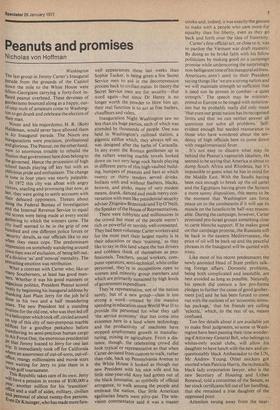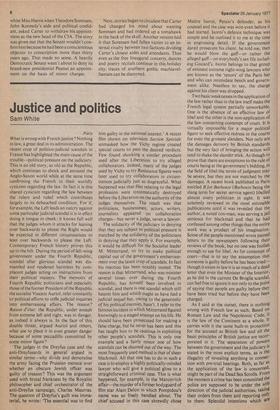Peanuts and promises
Nicholas von Hoffman
Washington The last group in Jimmy Carter's Inaugural Parade from the grounds of the Capitol down the mile to the White House were fellow-Georgians carrying a forty-foot inflated peanut overhead. These devotees of gooberismo bounced along as a happy, outof-step mob of amateurs come to Washington to get drunk and celebrate the election of their man.
Nixon and his majordomo, H. R. (Bob) Haldeman, would never have allowed them IR his Inaugural parade. The Nixon era Inaugurations were precision, professional and glorious. The Peanut, on the other hand, \yent to enormous trouble to rebuild the Illusion that government here does belong to the governed. Hence the procession of high school bands playing off key but with an Oblivious pride and enthusiasm. The change In tone in four years was nearly palpable.
In 1972 this city was afloat with angry victors, snarling and promising that now, at last, they were going to settle accounts with their defeated opponents. Threats about using the Federal Bureau of Investigation and the Internal Revenue Service to equal old scores were being made at every social gathering to which the winners came. The City itself seemed to be in the grip of one ,Ilundred and one different police forces or security' details, as our officials like to say ''hen they mean cops. The predominant Inlpression on somebody wandering around 'own then was of exclusion, of being left out,
a divisive 'us' and 'non-us' mentality. The Prevailing emotion was retribution.
What a contrast with Carter who, like so Many Southerners, at least has good manners. Whether it was his good manners or sa.gacious politics, President Peanut scored nicely by beginning his inaugural address by anking Just Plain Jerry for the job he'd unne in his two and a half meandering yearsThe new President led a standing ,°vation for the oLd one, who was then led off ic)a helicopter which took off, circled around an. top of this city of neo-pompous marble e.dtfices for a goodbye peekaboo before 'transferring its semi-precious human cargo Force One, the enormous presidential -I.e! that Jimmy loaned to Jerry for one last It immediately took off for California 0WIlere an assortment of out-of-sorts, out-of
mangy millionaires and movie stars
ere waiting for Jerry to join them in a avish golf tournament.
,This Republic takes care of its own. Jerry will have a pension in excess of 8100,000 a Y_ear, another million for his 'transition'
4ce and a staff of aides, military, civilian ind Personal of about twenty-five persons. ven Dr Kissinger, who has made more fare
well appearances these last weeks than Sophie Tucker, is being given a few Secret Service men to aid in the decompression process back to civilian status. In theory the Secret Service men are for security—that word again—but since Dr Henry is no longer worth the powder to blow him up, their real function is to act as free butlers, chauffeurs and valets.
inauguration Night Washington saw no less than six huge parties, each of which was attended by thousands of people. One was held in Washington's railroad station, a gigantic edifice which, they always tell us, was designed after the baths of Caracalla. In any event the Roman gentlemen up in the rafters wearing marble towels looked down on two very large rock bands playing in different parts of this high-vaulted building, hampers of peanuts and bars at which twenty or thirty tenders served drinks. Indians with and without feathers, blacks, browns, and pinks, many of very modest means, drank, danced and made merry conversation with men like presidential security adviser Zbigniew Brzezinski and Tip O'Neill, the Speaker of the House of Representatives.
There were lobbyists and millionaires in the crowd but most of the people weren't rich or powerful or terribly well-connected. They had been volunteer Carter workers and for the most part their largest equity is in their education or their 'training,' as they like to say in this land where the bus drivers and cobblers think of themselves as professionals. Teachers, social workers, computer operators, semi-technical, white collar personnel, they're in occupations open to women and minority group members and which are primarily sustained by high levels of government expenditure.
They're representative, not of the nation surely, but of a new group—class is too strong a word—created by the massive spending in education since World War II to provide the personnel for what they call 'the service economy' that has come into existence here in a land where technology and the productivity of machines have stopped employment growth in manufacturing, mining or agriculture. From a distance, though, the celebrating crowd did look typical or representative so that when Carter deviated from custom to walk, rather than ride, back up Pennsylvania Avenue to the White House it looked as though our new President with his nice wife and his little nine-year-old Amy had gotten out of the black limousine, so symbolic of official arrogance, to walk among the people and embrace the nation. Our little American egalitarian hearts went pitty-pat. The television commentator said it was a master
stroke and, indeed, it was exactly the gesture to make with a people who care more for equality than for liberty, even as they go back and forth over the idea of fraternity.
Carter's first official act, or close to it, was to pardon the Vietnam war draft resisters. By doing so he broke faith with his fellow politicians by making good on a campaign promise while underscoring the surprisingly non-belligerent tone of his inaugural address. Americans aren't used to their President saying things like 'we are a strong nation and we will maintain strength so sufficient that it need not be proven in combat—a quiet strength.' The speech may be misinterpreted in Europe to be tinged with isolationism but he probably really did only mean 'that even our great nation has its recognised limits and that we can neither answer all questions nor solve all problems.' Selfevident enough but needed reassurance to those who have wondered about the tendency of high officials here to come down with megalomaniacal fever.
It's not easy to discern what may lie behind the Peanut's vapourish idealism. He seemed to be saying that America is about to dump South Africa and Rhodesia, but it's impossible to guess what he has in mind for the Middle East. With the Saudis having been nice enough to break up the oil cartel and the Egyptians having given the Syrians a more sunny disposition, this seems to be the moment that Washington can force peace on to the combatants if it will use its muscle on the Israelis to be half-way reasonable. During the campaign, however, Carter promised pro-Israel groups something close to carte blanche support. If he makes good on that campaign promise, the Russians will be back in the eastern Mediterranean, the price of oil will be back up and the peaceful phrases in the Inaugural will be quoted with irony.
Like most of his recent predecessors the newly anointed Head of State prefers talking foreign affairs. Domestic problems, being both complicated and insoluble, are best avoided as long as possible. Naturally his speech did contain a few pro-forma pledges to further the cause of good gooberment [sic] and he has been forced to come out with the outlines of an 'economic stimulus package,' that his friends are calling 'eclectic,' which, to the rest of -us, means confused.
Too few details about it are available yet to make final judgments, so some in Washington have been passing their time wondering if Attorney-General Bell, who belongs to whites-only social clubs, will allow his daughter to have lunch with the new and unquestionably black Ambassador to the UN, Mr Andrew Young. Other snickers got snorted when Patricia Harris, the technically black lady corporation lawyer, who is the new Secretary of Housing and Urban Renewal, told a committee of the Senate, as her stock certificates fell out of her handbag, that she remained a true daughter of the oppressed poor.
Attention swung away from the near white Miss Harris when Theodore Sorensen, John Kennedy's aide and political confidant, asked Carter to withdraw his appointment as the new head of the CIA. The story was given out that the Senate wouldn't confirm him because he had been a co nscientious objector to conscription more than thirty years ago. That made no sense. A heavily Democratic Senate wasn't about to deny its brand-new presidential Peanut an appointment on the basis of minor charges. Next, stories began to circulate that Carter had changed his mind about wanting Sorensen and had ordered up a tomahawk in the back of the skull. Another version had it that Sorensen had fallen victim to an internal rivalry between two factions dividing Carter's closest aides and attendants. Thus even as the free Inaugural concerts, dances and poetry recitals continue in this holiday city, traces of southern gothic machiavellianism can be discerned.











































 Previous page
Previous page